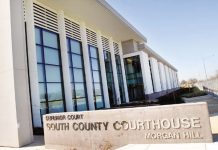Superior Court Judge Hector Ramon extended Charles Richard
Handley’s preliminary hearing for another month because one witness
still needs to testify and Handley’s defense attorney was unable to
show up at the San Martin courthouse Friday afternoon.
Superior Court Judge Hector Ramon extended Charles Richard Handley’s preliminary hearing for another month because one witness still needs to testify and Handley’s defense attorney was unable to show up at the San Martin courthouse Friday afternoon.
This was the fifth continuation in the case against Handley, 79, who was arrested April 26 at 971 Festa Aglio Court after firing at his former daughter-in-law, Lynda Handley, and her boyfriend, Lynn Ryle. Handley only wounded Lynda Handley, police said, after he apparently rented a car and drove to Gilroy from his San Jose home, toting a .357 magnum handgun. He then confronted the couple just before 6 a.m. in the garage of Ryle’s home.
He shot twice at Lynda Handley, missing both times; the woman grabbed the gun and tried to wrestle it away from Charles Handley, and was shot in the thigh as the two struggled, she told police. Lynn Ryle dove to the ground and threw a coffee mug at him; later, he was able to knock the elderly man down and pull the gun from him, according to a police report. Ryle then pinned Charles Handley down until police arrived.
Handley sat tight-lipped and straight-faced Friday afternoon in his red and orange prison garb as Judge Ramon and Deputy District Attorney Amir Alem discussed the latter’s last outstanding witness, a detective from the Gilroy Police Department who will testify at the courthouse Feb. 28 at 1:30 p.m.
The testimony and any cross examination should last two to three hours, Ramon said. The fact that Handley’s defense attorney, Victor Vertner, was unable to show up Friday also contributed to the preliminary trial’s continuation. Even if Vertner had shown up, though, Alem said he would have asked for a continuation because he claims Vertner was late filing paperwork detailing court precedent. Ramon is also considering a motion filed by Vertner to exclude evidence.
Letters and e-mails seized by police from the Handley home in San Jose show Charles Handley was infatuated with Lynda Handley, who was in the middle of divorce proceedings from Charles Handley’s son, Clifford Handley, after about 20 years of marriage.
Vertner wants to exclude a packet of papers and the contents of a computer that Gilroy police collected from Handley’s room at his son’s house in San Jose. These papers include $1,500 in $100 bills and a suicide note that read, “By the time you read this you will know what has taken place. This will solve some of your problems.”
Police seized the evidence after Charles Handley signed a consent form; however, he signed it after he invoked his right to an attorney but before he was assigned an attorney. Based on the argument that this process violated his Miranda rights, Vertner is also looking to exclude the letters because their seizure was not specifically mentioned in the consent form.
“Even if the court ruled the search wasn’t against (Charles Handley’s) Miranda rights, did officers go beyond scope of consent?” Ramon asked rhetorically Friday afternoon. “That’s what I’ll continue to focus on.”
Earlier testimony from Gilroy Detective Stan Devlin and Clifford Handley painted conflicting pictures of the scene at the Handley house after the incident. Devlin claimed he seized the father’s possessions, while Clifford Handley, who choked up several times during his testimony, was certain he was the one who took them out of his father’s room.
Regardless of who picked up the envelope, the search process was legal, Alem has said. Even if the evidence is excluded, the state will be able to establish premeditation based on the fact that Charles Handley drove to Gilroy about 5:30 a.m. with a handgun and have witnesses to attest to the shooting, he said.















